| Srl | Item |
| 1 |
ID:
167468
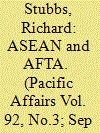

|
|
|
| 2 |
ID:
167466
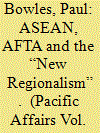

|
|
|
| 3 |
ID:
167467
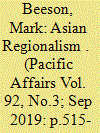

|
|
|
| 4 |
ID:
167469
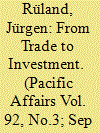

|
|
|
| 5 |
ID:
167465
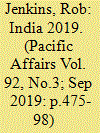

|
|
|
|
|
| Summary/Abstract |
India’s 2019 general election returned Prime Minister Narendra Modi, leader of the Hindu nationalist Bharatiya Janata Party (BJP), to a second term in office. The BJP increased its parliamentary majority and expanded beyond its core regions. Its victory was all the more impressive given the economy’s mediocre performance during Modi’s first five years in office and serious signs of political disaffection, including BJP losses in important state-level elections, just months before the national campaign commenced. Modi’s ability to turn things around is a testament to his personal popularity as well as the BJP’s well-funded and organized political machine. But it also reflects the party’s willingness to stoke nationalist passions, target minority groups, harass civil society, politicize national security, and undermine institutions of accountability. Despite the BJP’s impressive showing, and some of the methods by which it was achieved, claims that the 2019 election represents a transformation in the nature of Indian politics should be treated with caution.
|
|
|
|
|
|
|
|
|
|
|
|
|
|
|
|
| 6 |
ID:
167462
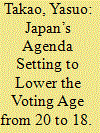

|
|
|
|
|
| Summary/Abstract |
What age a state designates as appropriate for voting rights raises a range of democratic and empirical issues. The lowering of the voting age in Japan in 2015 was the biggest expansion of the country’s democratic franchise since 1945, yet it happened in an abrupt manner. Lowering the voting age was not a significant issue among the Japanese public until the mid-2000s and the government began supporting the move officially only in 2014. Why then? What happened to precipitate this decision? This study argues that the circumstances governing the period before the policy decision was made are crucial to understanding what followed. In the prevailing theories of policy change, analysis has focused much more on the phase of decision making over policy; public opinion, policy beliefs, and policy transfer have been prominently cited as the major reasons for lowering the voting age in other countries. In contrast, this article claims that the policy opportunity spillover, from constitutional revision to voting age, was a necessary condition for lowering the age. The discussion of constitutional revision incidentally opened a policy window to another issue area, in this case voting age. The findings help us answer the question of what time period we need to examine in order to discern actual policy dynamics.
|
|
|
|
|
|
|
|
|
|
|
|
|
|
|
|
| 7 |
ID:
167464


|
|
|
|
|
| Summary/Abstract |
The recent Indonesian elections signalled relative stability in spite of the rise of contentious politics. To explain this, the article first discusses the way the incumbent Joko “Jokowi” Widodo’s administration has handled the rise of Muslim populism sponsored by his political opponents. This has included a reliance on illiberal measures, the political adjustment and “triangulation” of his policies, and a revival of Indonesia’s socio-religious and ethnic politics. Second, the article provides a longer historical perspective to show how the failure to restore the liberal parliamentary politics of the 1950s, and the inability to sustain the popular reforms of the mid-2000s that brought Jokowi to power, constitute more fundamental explanations both for the undermining of Indonesia’s democracy and for the provisional political stability.
|
|
|
|
|
|
|
|
|
|
|
|
|
|
|
|
| 8 |
ID:
167470
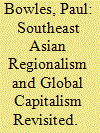

|
|
|
| 9 |
ID:
167463
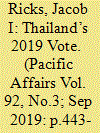

|
|
|
|
|
| Summary/Abstract |
Thailand’s March 2019 ballot was the first for the country since 2011, and for many it signaled the potential end of the military junta’s five-year rule. But was it truly a return to democracy? This essay argues that the election was far from a democratization event. Instead, it was a highly orchestrated exercise to ensure authoritarian longevity. The junta employed techniques of institutional engineering as well as managing the election’s outcomes in an effort to extend the premiership of Prayuth Chan-ocha despite increasing pressure for a return to civilian rule. The results of the election suggest that Thai society continues to exhibit deep divisions between those who support and those who oppose military interventions in politics. I further contend that the election should be seen as part of the continuing struggle by conservative forces in society to maintain their dominance in politics despite demands from other segments of the population for equal representation, a contest which is far from over.
|
|
|
|
|
|
|
|
|
|
|
|
|
|
|
|